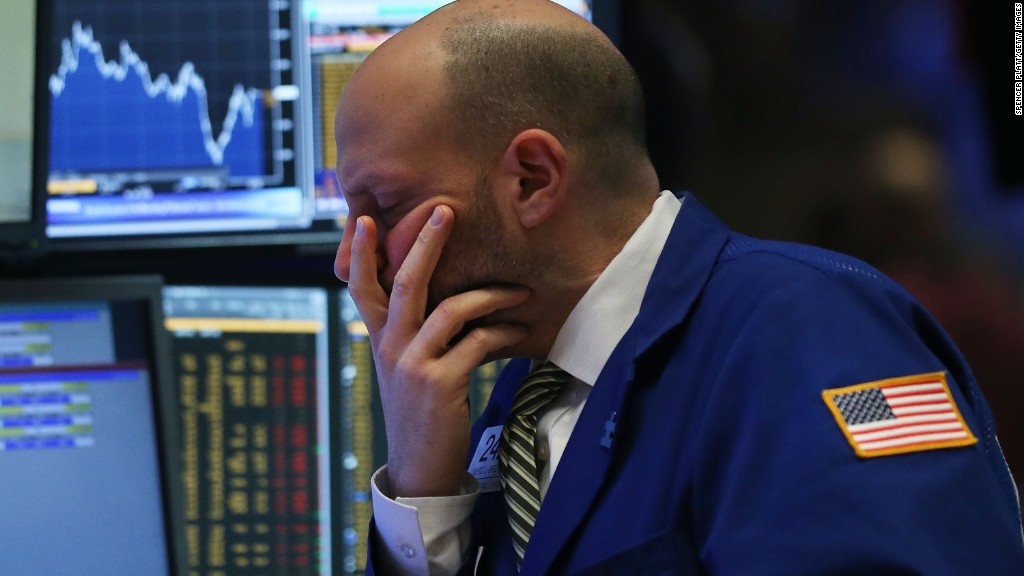
Fasten your seatbelts, this earnings season could be ugly.
The crash in oil prices and dramatic rise of the U.S. dollar is expected to continue to take a big toll on Corporate America's bottom line. It comes at a time when the world couldn't be more worried about the health of the Chinese economy and its effect globally.
It's so bad that analysts are bracing for a rare "recession" in profits to emerge from this earnings period, which kicks off in earnest next week. Fourth-quarter earnings from S&P 500 companies are expected to shrink by 5%, potentially marking the first back-to-back decline since 2009, according to S&P Capital IQ.
The timing couldn't be much worse for the stalled-out U.S. stock market. Wall Street just wrapped up its worst year since 2008 and stocks are trading at expensive valuations compared with historical norms.
At the same time, investors can no longer count on the Federal Reserve to juice risky assets with stimulus. Last month, the Fed raised interest rates for the first time in nearly a decade.
Related: China stock trading abruptly halted after 7% plunge
All of this magnifies the importance of corporate profits -- the traditional drivers of stock prices.
"Expensive valuations act as a headwind to the market, and further upside in 2016 will hinge increasingly on corporate earnings power," Paul Eitelman, North America investment strategist at Russell Investments, wrote in a report explaining why he's underweight U.S. stocks.
But the profit outlook doesn't look great, thanks largely to the fallout of the plunge in oil prices to seven-year lows. Cheap oil is great for consumers, but it's creating chaos for oil companies and some regional economies.
Fourth-quarter earnings from energy companies are expected to plummet by 68%, according to S&P Capital IQ. Some oil companies are suffering even more. Profits at Halliburton (HAL), for instance, are on track to nosedive 80% amid the slowdown in drilling activity.
Related: Is North Korea the market's new black swan?
Prices for other commodities like copper and iron ore have crumbled to crisis levels due in part to China's economic slowdown. Materials companies are expected to log a 24% decline in profits.
But the earnings trouble isn't all commodity related. Even if the gloomy energy sector is excluded, S&P 500 earnings would be expected to rise just 0.6%.
That's largely because of the strong U.S. dollar. The dollar has skyrocketed 20% against a basket of currencies since mid-2014 and it's now nearing parity with the euro.
A super-strong dollar hurts big U.S. multinational companies by making products sold overseas more expensive. (Think: iPhones sold in China.) It also shrinks international profits when they're converted back into dollars.
Even areas that are supposed to be doing well are setting off alarm bells. A record-high 25 consumer discretionary companies have issued fourth-quarter profit warnings, according to FactSet Research.
Many of those consumer companies, including Macy's (M) and Tiffany (TIF), pointed to the strong U.S. dollar.
That's why the direction of the U.S. dollar is pivotal this year. A further dramatic rise could spell trouble for more multinationals.
Related: Wall Street is 'underestimating' Fed rate hikes
Another wild card is how companies deal with pressure for wage hikes, which are great for consumer wallets but eat into corporate profits.
All of this explains why Michael Fredericks, portfolio manager of BlackRock's Multi-Asset Income Fund, thinks U.S. equity valuations need to come down.
"We're going to have an adjustment period. It will probably be a choppy process," he said.
The good news is that profits are expected to go back up. Analysts are calling for earnings growth of 1% in the first quarter of 2016, 4% in the second and 9% in the third.
"Despite our expectation of a fairly low profit trajectory, we believe it is sufficient to allow the bull market to continue," David Donabedian, chief investment officer of Atlantic Trust Private Wealth Management, wrote in a report.


